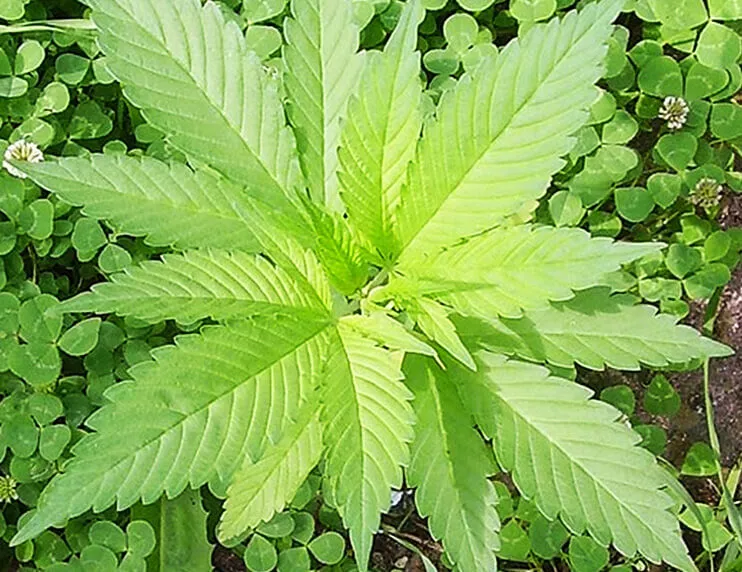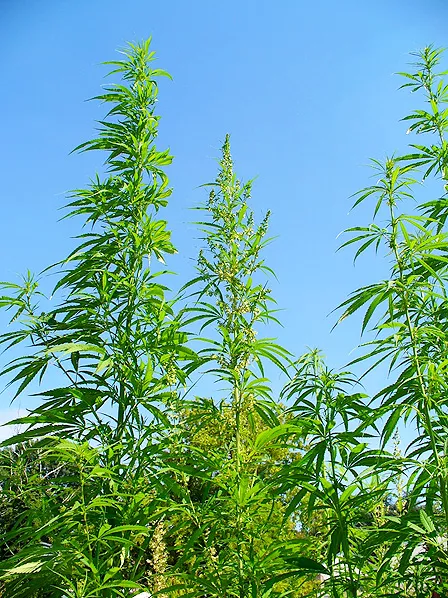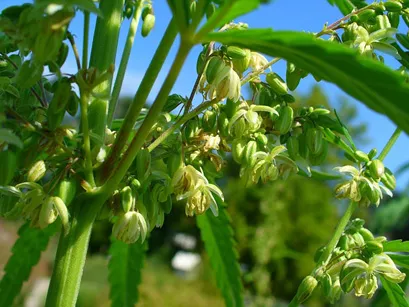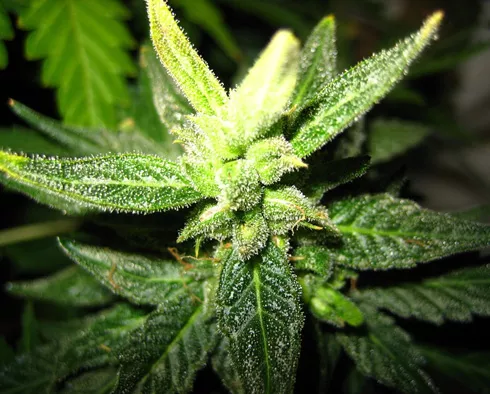Ferret News
CBD oil and pets: Exploring the science
By Dr. Rose-Anne Meissner, PhD

A hemp plant. Photo by Hendrike via Wikimedia Commons.
If you spend any time perusing the natural remedies aisle of a health food store or pharmacy, you are likely to come across products that contain CBD oil. Cannabidiol (CBD) oil is having a moment, as it’s being formulated into numerous products for humans, including lotions, face and body oils, serums, and supplements. What’s the science behind all the hype? Here we’ll explore what is known about this substance and discuss its impact on pet health, including our current recommendations for CBD oil use in ferrets.
What is CBD oil?
CBD stands for cannabidiol. CBD oil is oil that is infused with cannabidiol. (You may also see it called hemp oil.) CBD is one of 104 compounds produced by the plant species Cannabis sativa. Both marijuana and hemp are strains of C. sativa, and both marijuana and hemp plants produce CBD. But because marijuana is illegal at the federal level in the United States, CBD oil producers have chosen to use hemp as their source.
CBD is unique from its psychoactive cousin tetrahydrocannabinol (THC): CBD won’t get you high. It also doesn’t affect motor function, memory, or body temperature on its own. Because THC is the driving force behind marijuana’s legal status, the THC content of hemp cannot be higher than 0.3%. By comparison, marijuana plants can produce THC levels ranging from 15 to 40%. Pharmacological studies of THC and CBD have revealed that they have different interactions with the receptors (proteins) that mediate their effects.
CBD oil for human use
There has been a lot of research done on CBD oil with the intention of using it to treat human ailments. Biologically, mammals have a lot in common with each other, so human-based studies can inform our studies on non-human animals and vice versa. Because CBD oil is such a hot topic these days, we thought it was worth it to discuss some of the science behind CBD oil usage in humans. It’s entirely possible that CBD oil acts similarly in ferrets.
A brief skim of the internet reveals a lot of enthusiasm for using CBD oil to treat different problems in humans. It is promoted as a potential remedy for epilepsy, pain relief, anxiety, depression, nausea and vomiting, acne, schizophrenia, early-stage cancer, and diabetes. That’s an impressive list. Here’s what we know about the most commonly-studied conditions and CBD’s potential to help:
Epilepsy. Current data indicate that CBD oil may be a promising treatment to reduce seizure frequency in certain forms of epilepsy. However, in a 2014 review, Timothy E Welty and colleagues caution that
the extremely limited published studies were small, poorly described, and not well designed. Contributing to the difficulty of interpreting published studies, CBD products are not produced under the guidance of good manufacturing practices (GMP) and are not subject to regulations governing labeling, purity, and reliability. In other words, currently there is no guarantee of consistency between products, or even differing lots produced by the same manufacturer.
This problem of quality control for the manufacture of CBD-containing products is one that plagues many, if not all, studies on CBD.
Anxiety. There has been a lot of excitement about CBD oil as a treatment for anxiety. Researchers generally categorize anxiety into two types: stress-induced and general. CBD oil is effective at reducing stress-induced (acute) anxiety. Mateus M. Bergamaschi and colleagues found that a single 600 mg dose of CBD reduced the symptoms of social anxiety disorder (SAD) before a public speaking task. In some animal-based studies of general anxiety, CBD can reduce signs of anxiety at lower doses. Curiously, at higher doses, CBD can actually increase anxiety. In studies of healthy humans, CBD had no effect on baseline anxiety levels, but it “potently reduces experimentally induced anxiety or fear,” according to Esther M. Blessing et al. There is a huge gap in our knowledge of how long-term use of CBD affects anxiety. Blessing et al. explain that “Relatively few relevant studies exist, with mixed results, including both anxiolytic [anxiety-reducing] and anxiogenic [anxiety-producing] outcomes.”
Depression. In an animal model of depression, CBD oil improved the animals’ behavior, which is a sign that the treatment reduces depression. More studies in humans are necessary to assess how well CBD can treat depression in human patients.
Inflammation and pain. Numerous studies have demonstrated that CBD is a potent treatment for inflammation. CBD has reduced inflammation in a number of disease models, including inflammatory lung disease, inflammatory degenerative diseases (such as Parkinson’s and Alzheimer’s disease and multiple sclerosis), inflammatory bowel disease, and retinal inflammation. Because CBD has a big impact on inflammation (which often causes pain), it’s hard to say what CBD does for pain alone. In a review article, Pisanti and colleagues report that CBD is marginally better than placebo in the treatment of chronic pain. There are also concerns about CBD’s interactions with other drugs such as anticonvulsants and HIV protease inhibitors. CBD studies are often done using combinations of CBD with THC, thus making it difficult to say conclusively what impact CBD alone would have.
Arthritis. Studies on cannabinoids and arthritis are still largely in the early stages; existing studies tend to be small and are sometimes of poor quality, according to Dr. Daniel Clauw, MD, who was interviewed for an article published on arthritis.org. But so far, results from those studies are positive: studies in both animals and humans demonstrate that cannabinoids are useful for managing the pain associated with arthritis. For example, in one study of 58 patients who received either nabiximol (a mouth spray containing both CBD and THC) or placebo, the patients who received nabiximol reported improvements in pain and sleep. Although the study was short term, lasting just five weeks, it offers some encouraging results for the use of cannabinoids to alleviate some symptoms of arthritis.
Is CBD oil good for your health? Is it safe to take?
As I did my research for this article, one question that kept coming to mind for me was this: Should healthy people use CBD oil? The good news is that CBD is a relatively safe drug. The most common side effects are tiredness, diarrhea, and changes in appetite and/or weight. In humans, CBD is tolerated well across a wide range of doses. It’s much safer than THC, which can have unpleasant effects on heart rate, blood pressure, and body temperature, in addition to its psychoactive effects (which some users do not find enjoyable). CBD does seem to have some interactions with enzymes in the liver that metabolize drugs. Thus, if you already take medications and are interested in supplementing with CBD oil, it would be smart to talk to your doctor first. [Editor’s note: Ferret-World.com always recommends talking to a doctor/vet before making important health decisions for yourself or your pets.]
With all the excitement about CBD oil and its good safety profile, we understand if readers decide to start experimenting with CBD oil on themselves. The best advice we can offer, if you take that route, is to start with a small dose and slowly increase the dosage over time. Use a log to track how much you are giving yourself and what the observed results are. The science tells us that CBD can have different effects at low dosages versus higher dosages (for example, see the section on anxiety above).
As a generally healthy person, I started to wonder if I would benefit from supplementing with CBD oil. For a person like me who isn’t trying to treat a specific problem, it’s worth noting that CBD doesn’t seem to do much in the absence of a stimulus. Researchers Raymond Niesink and Margriet van Laar state, “Only when a stimulus (such as pain or a shock reaction) or another cannabinoid (such as THC) upsets the normal ‘tone’ of the endocannabinoid system is the effect of CBD expressed.” In other words, if you already feel okay, CBD probably won’t have a noticeable effect on you. Buying CBD products might be a waste of your money, but it probably won’t hurt you either.
A collection of Cannabis sativa plants growing outside. Image by H. Zell via Wikimedia Commons.
Male flowers of the Cannabis sativa plant. Image by H. Zell via Wikimedia Commons.
What do we know about cannabis and ferrets? What do vets recommend for now?
We have very little knowledge of what cannabinoids do to ferrets. We have so little knowledge, in fact, that we want to reprint the advice of a vet, Dr. Gregory Rich, who addressed this question in a recent “Ask a Vet” column (issue 15). Dr. Rich says
Right now, we do not have any valid studies on CBD oil dosage, side effects, or treatment strategies for ferrets. It is true that some ferret owners treat their pets with CBD oil, but this is dangerous because of our lack of knowledge. Each species and each ferret has its own drug sensitivities, disease states, and biological makeup, and so any dosage or treatment strategy with CBD oil would be a guess at best. And, unfortunately, if your ferret does develop a life-threatening side effect as a result of CBD oil, there is currently no antidote for the oil in pets. Vets would only be able to offer supportive care. Hopefully, we will have valid studies on the use of CBD oil in ferrets and other exotic species soon, but until then, it is safest not to give it to your ferret.
Given the plethora of ailments for which CBD may offer some relief, we were curious about what vets would recommend as a starting place for research on ferrets and CBD. Dr. Lynne Boggs of Griffith Small Animal Hospital in Austin, TX, thinks that pain management may be a good place to start. She told us,
There is a dearth of research [on CBD] for all species, including humans. I would like to know if there is any benefit as a pain medication. Also, is CBD beneficial with inter-ferret aggression or “bullying?” I have difficulty detecting anxiety in my ferret patients, although they surely have some. Anxiety (from separation or thunderstorms, for example) is something in dogs that owners are giving CBD for. Funding is always an issue with ferrets, so we end up extrapolating from other species.
Reader experiences with CBD oil and ferrets
When we reached out to the Ferret-World community on Facebook, a number of readers chimed in with their experiences in treating ferrets with CBD oil. We offer these stories not as medical advice but as a way of stimulating interest in more rigorous scientific studies on this topic. Please note all observations and opinions are from the readers and are not meant to be taken as an endorsement by the editorial team here at Dook Dook Ferret Magazine.
Special thanks to all our reader contributors for sharing with us their experiences! Responses may be edited for clarity.
Mary C. says: I’ve used it on my little tiny girl…she is just a wee ferret. But she is healthy and happy and playful. Except she became disinterested in her food. So, I thought I would try the CBD oil on her. I gave her about a quarter dropper full in the morning and the same at night. She improved. In a week, she started eating. For another week, I gave her about an eighth of a dropper full. She is pretty much back to her old self. I still give her a few drops several times a week…mainly because she enjoys it so much.
Gabi G. says: I have used it for my ferrets. Honestly, my ferret Skadoodle has adrenal gland disease, and after I gave him CBD oil, all his hair grew back and he isn’t bloated anymore. I didn’t even have to get him meds or surgery; he’s actually back to normal. My other ferret Daxter has insulinoma and he was supposed to take meds, but instead I used CBD oil and he’s perfectly fine now.
Robert B. says: I took one of my fuzzies to the vet just to be told to take her home, say goodbye and bring her back when she is ready. She was diagnosed with tumors and enlarged spleen over two years ago and has been on steroids since. I have been giving her CBD since then, one drop a day, which is a lot for a ferret, but that is the smallest amount I can give. CBD cannot overdose, so I don’t worry much about it. She sleeps more, probably due to the CBD, but hey, who can blame her? Two months later she is still with us, with no signs of feeling bad and a great appetite.
Dominica R. says: It did extend the life of one of my boys by 18 months after the initial diagnosis of two months left to live. I used it intuitively though…I don’t know if what I did was right, if it was the CBD that helped, or was it his will to live and fight. But the vet said he would be gone in 2-3 months. He had sarcoma [cancer] in his mouth, all over his gums and upper jaw. I used to put one drop directly on the cancerous tissue in his gums every morning. I then learned that you can put it into his food, so I started doing that.
Dook Dook’s recommendations for ferrets
After we decided to publish an article on CBD oil in ferrets, we realized it would be a controversial topic because we have little to no information on the use of CBD oil in ferrets. But it’s such an interesting topic that we wanted to explore what is known about CBD oil, especially in humans. Our hope is that the information presented here is viewed with curiosity and skepticism, not as medical advice.
For ferrets, we have three pieces of advice, based on what we would do with our own animals:
- The safest route for now is to not use CBD oil with ferrets. We just don’t know enough about ferret biology and cannabinoids.
- If you do want to try CBD oil with a ferret, start with a very small dose and keep a meticulous log of dates, dosage, and observed effects. Share this log with your vet.
- Be aware that there is no antidote if your ferret has a severe adverse reaction to CBD oil. Although CBD oil is fairly safe in humans, we don’t know much about its safety profile in ferrets.
Further reading
Bergamaschi, Mateus M. et al. “Cannabidiol Reduces the Anxiety Induced by Simulated Public Speaking in Treatment-Naive Social Phobia Patients.” Neuropsychopharmacology, volume 36, issue 6. Published in 2011. (Scholarly article)
Blessing, Esther M. et al. “Cannabidiol as a Potential Treatment for Anxiety Disorders.” Neurotherapeutics, volume 12, issue 4. Published in 2015. (Scholarly article)
Cadena, Aaron. “Hemp vs. Marijuana: The Difference Explained (2019 Update).” Medium. Published on 10 September 2018. https://medium.com/cbd-origin/hemp-vs-marijuana-the-difference-explained-a837c51aa8f7. Accessed 3 June 2019. (Web page)
“Cannabis sativa.” Wikipedia. Updated on 7 May 2019. https://en.wikipedia.org/wiki/Cannabis_sativa. Accessed 3 June 2019. (Web page)
Grohol, John M. “CBD Oil for Depression, Schizophrenia, ADHD, PTSD, Anxiety, Bipolar, & More.” PsychCentral. Updated 8 February 2019. https://psychcentral.com/blog/cbd-oil-for-depression-schizophrenia-adhd-ptsd-anxiety-bipolar-more/. Accessed 5 June 2019. (Web page)
Kubala, Jillian. “7 Benefits and Uses of CBD Oil (Plus Side Effects).” healthline. Published on 26 February 2018. https://www.healthline.com/nutrition/cbd-oil-benefits. Accessed 3 June 2019. (Web page)
Lowin, Torsten, Schneier, Matthias, and Georg Pongratz. “Joints for Joints: Cannabinoids in the Treatment of Rheumatoid Arthritis.” Current Opinion in Rheumatology, volume 31, issue 3. Published 1 May 2019. (Scholarly article)
Maroon, Joseph ,and Jeff Bost. “Review of the Neurological Benefits of Phytocannabinoids.” Surgical Neurology International, volume 9, issue 91. Published on 26 April 2018. (Scholarly article published online)
Niesink, Raymond J.M., and Margriet W. van Laar. “Does Cannabidiol Protect Against Adverse Psychological Effects of THC?” Frontiers in Psychiatry, volume 4. Published in October 2013. (Scholarly article)
Pisanti, Simona et al. “Cannabidiol: State of the Art and New Challenges for Therapeutic Applications.” Pharmacology & Therapeutics, volume 175. Published in 2017. (Scholarly article)
Punjabi, Rajul. “I Visited a Cannabis Farm to Find Out How CBD Oil is Made.” Vice. Published on 23 October 2018. https://www.vice.com/en_us/article/wj9knb/i-visited-a-cannabis-farm-to-find-out-how-cbd-oil-is-made. Accessed 3 June 2019. (Web page)
Rath, Linda. “CBD Oil: Should You Try it for Arthritis Symptoms?” Arthritis Foundation. https://www.arthritis.org/living-with-arthritis/treatments/natural/supplements-herbs/cannabidiol-oil.php. Accessed 7 June 2019. (Web page)
Riggs, Mike. “Is CBD a Miracle Cure or a Marketing Scame? (Both.)” Reason. Published in February 2019. https://reason.com/2019/01/13/is-cbd-a-miracle-cure-or-a-mar. Accessed 7 June 2019. (Online article)
Weiss, Suzannah. “This is Why Weed Makes Some People Anxious.” Vice. Published on 6 February 2018. https://www.vice.com/en_us/article/gy8pa9/weed-causes-anxiety-for-some-people. Accessed 5 June 2019. (Web page)
Wilson, Debra Rose. “Can CBD Oil Help Anxiety?” Medical News Today. Updated 27 July 2018. https://www.medicalnewstoday.com/articles/319622.php. Accessed 3 June 2018. (Web page)
A close-up image of hemp flowers. Image by Erik Fenderson via Wikimedia Commons.







